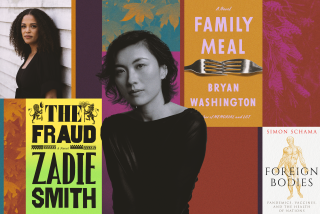HEMINGWAY by Kenneth S. Lynn (Fawcett Columbine/...
- Share via
HEMINGWAY by Kenneth S. Lynn (Fawcett Columbine/ Ballantine: $9.95)
Winner of last year’s Los Angeles Times Book Prize in the category of biography, Kenneth Lynn’s “Hemingway” is a major re-evaluation and psychological analysis of the author’s life and work. Debunking the myths that Hemingway promoted about himself, Lynn builds a controversial case for “a conflicted, haunted man who produced from his torment some of the most memorable fiction of the century.”
Lynn traces the machismo in Hemingway’s persona and in his fiction to the first five years of his life, when his mother dressed him like a little girl.
But against Richard Eder’s observation that this practice was not uncommon, Kenneth Lynn wrote: “What made Hemingway’s childhood abnormal was not so much his Edwardian smocks, but (his mother’s) insistence on raising him and Marcelline as twins. . . . Is it any wonder that sexual anger, anxiety and confusion became the fate of Hemingway the man, or that his novelistic portrayals of romance . . . are all marked by androgynous kinkiness?”
THE SONGLINES by Bruce Chatwin (Penguin Books: $7.95)
Europeans call them “Dreaming-tracks” or “Songlines”; but in native aboriginal lore, the labyrinth of invisible pathways that criss-cross Australia are “Footprints of the Ancestors.”
At the book’s opening, Bruce Chatwin is in Alice Springs, Australia, hoping to learn for himself what a Songline is. A friend directs him to the Russian Arkady Volchok, who’s been hired by a railroad company to map the “sacred sites of the Aboriginals” so the company can avoid trespassing as it lays down the track for the Alice to Darwin route. But he confesses a problem he has: “If you look at it their way, the whole bloody Australia’s a sacred site,” because the aboriginals’ nomadic ancestors, in traversing the entire continent, made it their own. Arkady explained “how each totemic Ancestor, while traveling through the country, was thought to have scattered a trail of words and musical notes along the line of his footprints.” Such are the Songlines. The man who “went ‘Walkabout’ ” made a ritual journey. “He trod in the footprints of his Ancestor.”
“The Songlines” is the fascinating story of Chatwin’s venture into the bush with Arkady, his own attempt to learn and re-create the aboriginals’ ritual journeys, to learn their legends and myths. The book is, in Western terms, a lyrical travelogue, Chatwin’s own walkabout.
THE ELIZABETH STORIES by Isabel Huggan (Penguin Books: $6.95)
A searing account of childhood and adolescence, grouped as a collection of stories, but with the cumulative power of a novel. These stories are about a Canadian girl, Elizabeth Kessler, and peripherally about her parents and classmates--but the real subject here is memory, transcended into fiction but painfully acute. Elizabeth’s father, aloof, cold, stocky as a tree, is a bank manager. When Elizabeth is discovered in sexual experimentation with the son of the town butcher, the father conspires to turn down the butcher’s request for a loan. Elizabeth, guilty over her sexual feelings and fumblings, feels herself the cause of the butcher’s family being driven out of town.
In other stories, Elizabeth is sent away to camp and plays forbidden and shameful (she believes) sex games with her bunk mates. Socially inept, uncomfortable with herself and unhappy, Elizabeth triumphs because she escapes to study science in Toronto. “Wounded though we may be,” she says, “we are still intact.”
MORTAL CHOICES Ethical Dilemmas in Modern Medicine by Ruth Macklin (Houghton Mifflin: $8.95)
A 28-year-old man, diagnosed with chronic schizophrenia, is suffering from kidney failure, yet he refuses the dialysis that would cleanse his blood. An infant is born with a severe case of spina bifida; paraplegia is certain, so the child will never walk, but mental retardation can be avoided or lessened by draining the fluid exerting pressure in the brain. Do parents have the right to refuse this treatment?
These and lesser ethical dilemmas confront physicians, nurses and medical practitioners on a daily basis. In “Mortal Choices,” Ruth Macklin, a professor of bioethics at New York’s Albert Einstein College of Medicine, has written a cogent, instructive guide to medical ethics, all the more necessary with today’s dramatic medical advances.
BAD GUY by Rosalyn Drexler (PAJ Publications: $7.95)
A lunatic black comedy, by the author of “To Smithereens,” about Jesus Allendez, a teen-age psychopath and murderer, and the narrator, a do-gooder psychiatrist who wins the right to treat him. Mathilde Brophy, self-styled maverick practitioner, convinces state authorities to let him come home with her, for the purpose of closer evaluation. There, she tries to analyze him through his obsession with television and television characters. “I toyed with the idea that Kojak . . . was Jesus’ super-ego, holding dangerous impulses at a distance.”
Drexler’s parody is scattershot and bizarre. In the end, Jesus rapes the psychiatrist, but she’s so fixated on his case that she fails to inform the authorities. Ultimately, he escapes, and Mathilde’s career and reputation are ruined. It turns out the psychiatrist is just as crazy as the patient.
More to Read
Sign up for our Book Club newsletter
Get the latest news, events and more from the Los Angeles Times Book Club, and help us get L.A. reading and talking.
You may occasionally receive promotional content from the Los Angeles Times.










